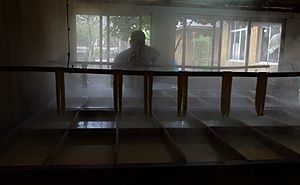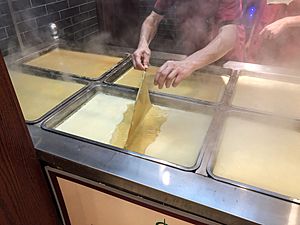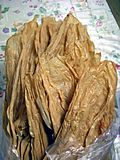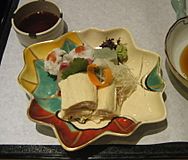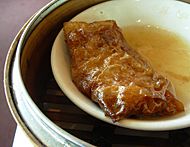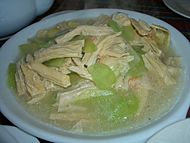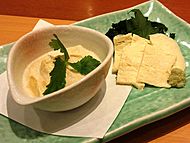Tofu skin facts for kids
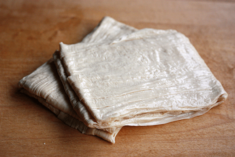 |
|
| Nutritional value per 100 g (3.5 oz) | |
|---|---|
| Energy | 2,217 kJ (530 kcal) |
|
7.2 g
|
|
| Dietary fiber | 3.0 g |
|
32.1 g
|
|
| Saturated | 4.98 g |
| Monounsaturated | 7.50 g |
| Polyunsaturated | 16.26 g |
|
Protein
|
50.4 g
|
| Vitamins | Quantity
%DV†
|
| Vitamin A equiv.
beta-Carotene
|
0%
1 μg
0%
7 μg |
| Thiamine (B1) |
30%
0.35 mg |
| Riboflavin (B2) |
10%
0.12 mg |
| Niacin (B3) |
9%
1.4 mg |
| Pantothenic acid (B5) |
11%
0.55 mg |
| Vitamin B6 |
25%
0.32 mg |
| Folate (B9) |
10%
38 μg |
| Vitamin E |
16%
2.4 mg |
| Vitamin K |
52%
55 μg |
| Minerals | Quantity
%DV†
|
| Calcium |
21%
210 mg |
| Copper |
164%
3.27 mg |
| Iron |
64%
8.3 mg |
| Magnesium |
62%
220 mg |
| Phosphorus |
86%
600 mg |
| Potassium |
28%
840 mg |
| Selenium |
10%
7 μg |
| Sodium |
1%
12 mg |
| Zinc |
52%
4.9 mg |
| Other constituents | Quantity |
| Water | 6.9 g |
| Water Soluble Dietary Fiber | 0.6 g |
| Insoluble Dietary Fiber | 2.4 g |
| Biotin(B7) | 37.3 µg |
|
Vitamin E showed only α-tocopherol
|
|
| †Percentages estimated using US recommendations for adults. | |
| Regional names | |||||||||||||
|---|---|---|---|---|---|---|---|---|---|---|---|---|---|
| Chinese name | |||||||||||||
| Chinese | 腐皮 | ||||||||||||
| Literal meaning | beancurd skin | ||||||||||||
|
|||||||||||||
| Chinese name 2 | |||||||||||||
| Chinese | 豆腐皮 | ||||||||||||
| Literal meaning | tofu skin | ||||||||||||
|
|||||||||||||
| Korean name | |||||||||||||
| Hangul | 두부껍질 | ||||||||||||
| Literal meaning | tofu skin | ||||||||||||
|
|||||||||||||
| Japanese name | |||||||||||||
| Kanji | 湯葉 | ||||||||||||
| Kana | ゆば | ||||||||||||
|
|||||||||||||
Tofu skin, also called Yuba or beancurd skin, is a food made from soybeans. When soy milk is heated in a shallow pan, a thin film forms on top. This film is mostly soy protein and fat. People collect these films and dry them into yellowish sheets. This is tofu skin!
Even though it's called "tofu skin," it's not made in the same way as regular tofu. Tofu uses a special ingredient to make the soy milk curdle. Tofu skin doesn't use this. But it still has a similar feel and taste to some tofu products. Tofu skin has been used in cooking for a long time. People first wrote about it in China, Korea, and Japan in the 1500s. It's used fresh, fermented, or dried in many dishes from these countries.
Contents
History of Tofu Skin
People have enjoyed tofu skin for centuries. The first time it was written about was in Japan in 1587. A person named Matsuya Hisamasa wrote about it in his diary, Matsuya Hisamatsu chakai-ki. He simply said that tofu skin is the film that forms on top of hot soy milk.
Around the same time, tofu skin was also mentioned in China. It appeared in a big book about plants and medicines called Bencao Gangmu. This book was finished in 1578 by Li Shizhen, but it was printed in 1596. In one part of the book, it says that if a film forms on soy milk when it's heated to make tofu, you should lift it off and dry it. This dried film, called doufu pi, is a tasty food all by itself!
Another old mention of tofu skin is from Japan in 1695. It's in a book called Ben Zhao Shi Jian. The book was written by Hitomi Hitsudai in Chinese. When Japanese people read the Chinese words for tofu skin, doufu-lao, they say tōfu no uba. The word uba means "old woman" or "wet nurse."
How Tofu Skin is Made and Used
You can buy tofu skin fresh or dried. If it's dried, you need to soak it in water before you use it. It's often used to wrap up tasty fillings, like in dim sum dishes.
Tofu skin has a slightly chewy texture. Because of this, it's often shaped into bunches, folds, or wraps. These shapes are used as meat substitutes in vegetarian meals. For example, tofu skins can be wrapped and folded to make dòu baō (which means "tofu package"). These are often fried to make them firmer before being cooked more.
Different Forms of Tofu Skin
Tofu skin comes in a few main forms, each with many varieties.
- Fresh Tofu Skin: This is the soft, freshly made skin.
- Dried Tofu Skin: This is often sold as long, dried sticks called dried beancurd sticks (fǔzhú). You soak these sticks in water to make them soft again. If you layer and bunch fresh or rehydrated tofu skin, tie it tightly, and then stew it, it keeps its shape. This bunched tofu skin is sometimes called tofu chicken (dòu jī) or fawng dtâo-hûu in Thai cooking. In Southeast Asia, it's often called Foo Chuk.
Tofu Skin as Meat Alternatives
Tofu skin can be layered and bunched in special ways to look like chicken breast. People often fry the "skin" side to make it crispy, just like real chicken skin. If you fill it with vegetables, it can become "tofu duck." Many other meat alternatives are made this way, especially in Buddhist vegetarian restaurants.
The first "meatless meats" were probably made in China by Buddhist cooks. They would roll thin sheets of tofu skin around a filling. This filling might be minced, smoked, or seasoned pieces of tofu skin. They would tie the bundle with string and steam it. This process made it feel and taste like meat.
Tofu Skin Logs
Another way to use tofu skin is to roll it tightly around a chopstick. Then, you steam the rolled tofu skin to make a log shape. When you slice the log, each piece is round with a square hole in the middle. This makes them look like old Chinese coins.
Images for kids
-
Yuba served as a main course in Kyoto
-
Tofu skin roll in dim sum cuisine
See also
 In Spanish: Yuba (alimento) para niños
In Spanish: Yuba (alimento) para niños
 | Sharif Bey |
 | Hale Woodruff |
 | Richmond Barthé |
 | Purvis Young |


